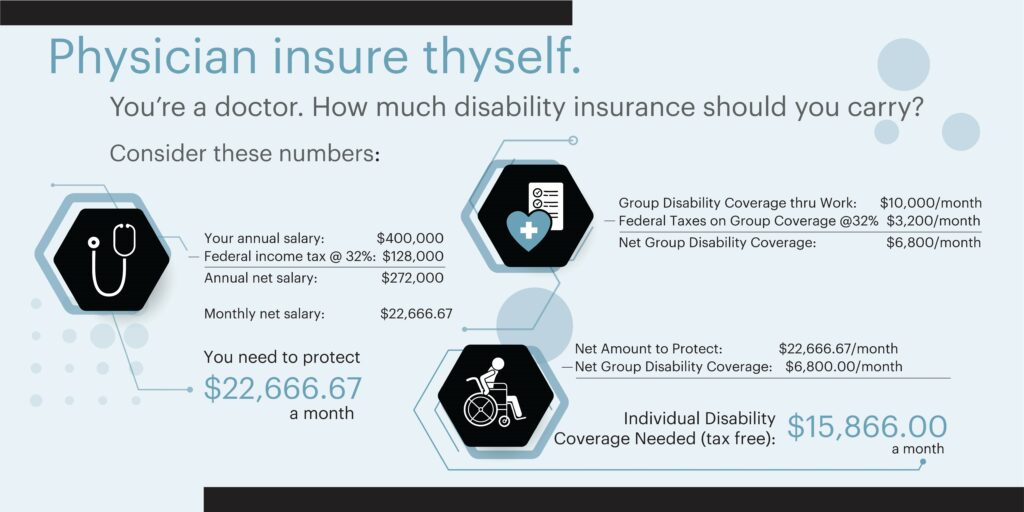The outset of a career as a medical professional is incredibly demanding, financially as well as professionally. Residents spend 60 to 70 hours a week honing their skills, and at an average medical resident salary of about $67,000 or less than $6,000 a month. As well, most are carrying huge debt from their education, about $200,000 on average. Few eat well or exercise, much less take time to think about something like disability insurance, though it has proven one of the most valuable assets a physician, dentist, pharmacist, or veterinarian can own.
So what is disability insurance, why should you have it, and what are the different ways to buy it?
Disability insurance provides income to you if you become unable to work. And by providing money for you to live on, it also serves to protect your future income, save your home, and keep your financial plan in motion.
Getting disability insurance while still in residency is multi-faceted:
Can You Retire Tomorrow?
Okay, not a fair question, but if the answer is the obvious “no,” then you need disability insurance. The life of a healthcare professional is physically challenging. According to a 2001 JAMA study, about 3.1% of practicing physicians in the United States self-identified as having a disability. Healthcare professionals are not immune to the risks of disability in their line of work. A notable study published in the British Medical Journal (BMJ) in 2020 highlighted that healthcare workers were seven times more likely to develop severe COVID-19 compared to non-frontline workers. Beyond the physical risks, the pandemic has also taken a significant toll on their mental well-being. High levels of burnout, depression, and anxiety have been prevalent among healthcare workers, contributing to a marked increase in turnover rates. This underscores the critical importance of considering disability insurance for medical professionals, as a safeguard against the unpredictable nature of their demanding careers.
What Happens If You’re Injured or Ill?
If you are injured or diagnosed with an illness and can’t work, it would be too late to qualify for disability insurance. You could find yourself in a challenging financial situation without coverage. Treatment and living expenses can quickly accumulate, potentially costing thousands of dollars depending on the severity, duration of the disability, and the state you live in. People with disabilities, 38% of whom have 10 or more doctor visits annually, have more hospital visits and admissions, leading to higher annual healthcare costs ($13,492) compared to those without disabilities ($2,835), including greater out-of-pocket expenses. Don’t wait. It’s not worth the risk.
You Can Start Small
Many carriers offer residents a 10 to 20 percent policy discount. I advise starting with a policy that provides for a monthly benefit of $5,000. The premium for a 30-year-old would likely be between $900 and $1,200 annually, about $75 to $100 a month. We attach an annual increase rider to the policy, which allows you to increase coverage as your income increases without additional underwriting.
Most policies pay out until age 65. That means a policy bought at age 30 would pay you for 35 years; at $5,000 a month, that’s $2.1 million dollars over those 35 years. And if you pay your own premiums with after-tax dollars, those payments to you will not be taxable.
Disability Insurance Options
There are three ways to buy disability insurance: group coverage, an individual policy, or guaranteed standard issue.
- Group coverage: The organization you’re working for in residency might offer group coverage. There is a limit on how much you can customize group coverage to suit your particular needs, but it is typically less expensive than individual coverage. If you have your own individual disability insurance and a group policy is offered, you can use it to supplement your own coverage. The employer usually pays the premium, which means any benefits you receive down the road will be taxable to you. Employer coverage is not portable. When you leave for another job, your group coverage will not travel with you.
- Individual policy: An individual policy requires medical and financial underwriting, but is highly customizable and offers portability. You own and pay the premiums yourself. If you leave your employer to accept another job, your policy goes with you (as long as you keep paying premiums). These policies usually cost more than group coverage, but the idea is to have a blend of the two to protect what will be higher income in your future.
- Guarantee standard issue (GSI): GSI aims at bridging the gap between group and individual disability insurance. It is an individual policy, which is portable, but requires participation of a group. As individual coverage, it allows access to those with pre-existing conditions, and it offers some customization, though not to the extent of individual insurance. Insurance carriers support GSI plans when there is a substantial number of eligible participants to help reduce the risk, but not all employers offer GSI plans.
Noncancelable vs. Guaranteed Renewable Contracts
Understanding the distinction between noncancelable and guaranteed renewable contracts is crucial. Noncancelable contracts offer unparalleled stability, ensuring coverage and premium rates remain fixed as long as premiums are paid. Many individual policies are noncancelable contracts. On the other hand, guaranteed renewable contracts promise policy renewal but may allow for premium increases, albeit uniformly across certain policyholder classes. Physicians, as high-income professionals, may prioritize the certainty provided by noncancelable contracts to safeguard against unexpected changes in coverage or premiums. However, both options offer valuable protection against policy cancellation due to changes in health or occupation, catering to individual preferences and needs.
Additionally, considering a future increase option rider, becomes crucial for professionals expecting substantial income growth. This option allows for increasing coverage in line with income without further medical underwriting. Physicians and other high-earning individuals must weigh these factors carefully to secure comprehensive coverage aligned with their evolving financial circumstances.
GSI Advantages and Disadvantages
Guaranteed Standard Issue (GSI) insurance offers its own set of advantages and disadvantages. The primary advantage of GSI is the absence of underwriting, which allows for coverage without individual health evaluations. This is particularly beneficial for those who might face challenges in obtaining insurance due to pre-existing conditions. Furthermore, GSI typically comes with group pricing, potentially reducing premiums because the risk is distributed across a broader base. Additionally, these policies are often portable, providing ongoing coverage despite changes in employment.
GSI policies also provide unisex pricing, providing a more competitive option for women. Insurance companies have traditionally charged higher premiums for women because they tend to file more disability claims and have longer periods of disability compared to men as women generally seek more healthcare and treatment than men, even when maternity claims are excluded.
However, GSI has its drawbacks. The coverage is generally less tailored than individual policies, potentially not meeting the specific needs of all individuals within the group. Another significant disadvantage is its susceptibility to group risks; the overall health profile of the group can influence the costs and benefits for all members. For instance, a group with a higher health risk may face increased premiums. Moreover, GSI usually offers limited coverage compared to individual policies. This limitation might necessitate additional individual insurance plans to cover gaps, particularly in scenarios of severe or long-term disabilities.
Consider this hypothetical example that demonstrates how we design disability insurance coverage:

The information on this slide is only intended for educational purposes to show an example of this type of offering.
In light of this, it becomes clear that for healthcare professionals obtaining disability insurance is not just a prudent choice, but a necessary step in career planning. Healthcare professionals often face unique risks due to the demanding nature of their work, both physically and mentally. Therefore, having a disability insurance plan tailored to their specific needs can provide a safety net in the unpredictable event of an illness or injury that could impede their ability to work. Such insurance not only offers financial security but also peace of mind, ensuring that they can focus on their demanding roles without the added stress of financial instability in case of disability. As such, healthcare professionals should consider disability insurance as an integral part of their professional and financial strategy.
For any questions or to discuss your disability insurance needs further, please contact us at (814) 459-1116; we’re here to assist you in securing your career and financial future.
IMPORTANT DISCLOSURES
The information included in this document is for general, informational purposes only. It does not contain any investment advice and does not address any individual facts and circumstances. As such, it cannot be relied on as providing any investment advice. If you would like investment advice regarding your specific facts and circumstances, please contact a qualified financial advisor.
Any investment involves some degree of risk, and different types of investments involve varying degrees of risk, including loss of principal. It should not be assumed that future performance of any specific investment, strategy or allocation (including those recommended by HBKS® Wealth Advisors) will be profitable or equal the corresponding indicated or intended results or performance level(s). Past performance of any security, indices, strategy or allocation may not be indicative of future results.
The historical and current information as to rules, laws, guidelines or benefits contained in this document is a summary of information obtained from or prepared by other sources. It has not been independently verified, but was obtained from sources believed to be reliable. HBKS® Wealth Advisors does not guarantee the accuracy of this information and does not assume liability for any errors in information obtained from or prepared by these other sources.
HBKS® Wealth Advisors is not a legal or accounting firm, and does not render legal, accounting or tax advice. You should contact an attorney or CPA if you wish to receive legal, accounting or tax advice.
